27 Best things to do in abuja nigeria (2025 Insider Guide)
Abuja is a planned, green, and welcoming capital that’s easy to explore in a few days yet full of surprises if you stay longer.
This guide pulls together the most up-to-date highlights, including reopenings, new activities, and transit changes—so you can pick the perfect things to do in Abuja, Nigeria without guesswork.
From parks and art to markets, hikes, and lakeside sunsets, you’ll find it all below.
Quick Snapshot: Why Abuja?
- Green & planned: Abuja was designed with wide roads, green belts, and purposeful districts, which makes it feel calm and spacious compared to many capitals.
- Parks & water: You’ll find sweeping lawns, lakes, and picnic spaces (hello, Millennium Park and Jabi Lake).
- Culture & craft: Explore the National Mosque and the National Christian Centre, then pick up handmade souvenirs at the Arts & Crafts Village, now back in action after years of closure.
- Easy transport: Uber and Bolt operate; the Abuja Rail Mass Transit linking the city with Nnamdi Azikiwe International Airport was relaunched in 2024.
- Best time: Mornings and late afternoons are cooler; Harmattan (Dec–Feb) brings dry, dusty air and soft sunsets.
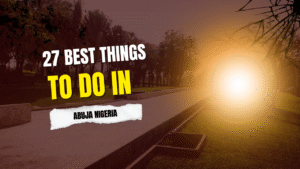
Best Things to Do in Abuja, Nigeria (Top 27)
Below are 27 ideas arranged for first-timers and repeat visitors. Mix a few daily for an easy, balanced itinerary.
1) Take a serene walk through Millennium Park (Maitama)
Abuja’s largest public park blends Italian-style garden geometry with natural zones. Stroll the travertine path, peer into pools and fountains, and grab golden-hour photos. It’s central, free, and ideal for picnics.
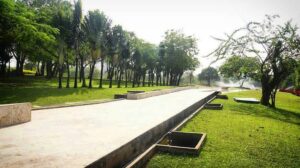
2) Tour the Abuja National Mosque & the National Christian Centre
Architecture lovers will enjoy both landmarks sitting opposite each other on Independence Avenue and in the Central Area.
Dress modestly; non-Muslim visitors typically avoid prayer times at the Mosque. Sundays from ~10 am are service hours at the Christian Centre. Always ask staff about photography rules.
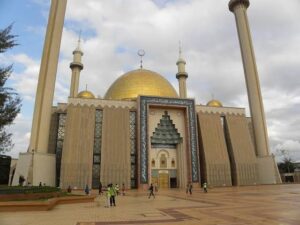
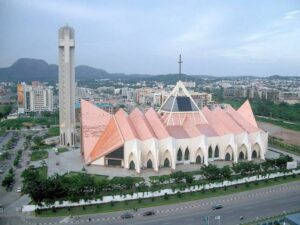
3) Chill by Jabi Lake & try the Jabi Boat Club
Jabi Lake is a former water reservoir turned recreation spot. Expect breezes, photo spots, casual cafés, and water activities (cruises, kayaking, occasional jet skis via clubs).
Pair your visit with a movie at Silverbird Cinemas in nearby Jabi Lake Mall.
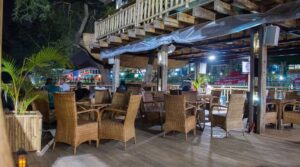
4) Experience modern Nigerian art at Thought Pyramid Art Centre (Wuse II)
A respected space that champions modern and contemporary African art, right in Wuse II (18 Libreville Crescent). Watch for rotating exhibits.

5) Stop by Nike Art Gallery (Airport Road)
Yes—Abuja has a Nike outpost. It’s an easy stop if you’re airport-bound. Check posted hours (often 10am–6pm Mon–Sat).
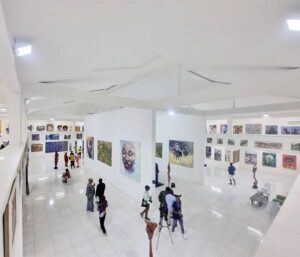
6) Browse the reopened Arts & Crafts Village (opposite Abuja Continental Hotel)
This open-air market is back. Find carvings, textiles, beads, and paintings; practice polite bargaining. It’s central and makes a perfect souvenir stop.
7) Spend a fun afternoon at Magicland Amusement Park
Formerly “Wonderland,” Magicland offers family rides and seasonal promos; opening hours typically run midday to evening (check posts for current pricing).
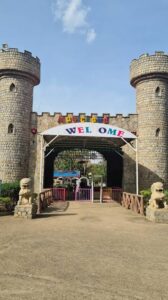
8) Picnic at National Children’s Park & Zoo (Asokoro)
Green lawns, animal enclosures, and playgrounds near the Presidential area. Hours often 8am–5pm (verify locally).

9) Walk the palms at Sarius Palmetum & Botanical Garden (Maitama)
A quiet garden with hundreds of palms and shaded trails—great for photos and nature lovers. Look for the Maitama address on Ibrahim Babangida Boulevard.
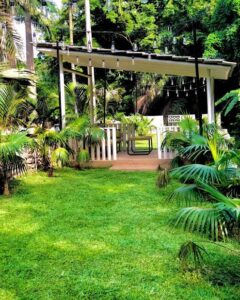
10) Play mini-golf or go-karts at Central Park
A lively hangout with a 9-hole mini-golf course; perfect for groups and families.
11) Hike to views at Mpape Crushed Rock
This abandoned quarry transformed into a scenic cliff-and-lake viewpoint. Go early, wear good shoes, and keep a safe distance from edges.
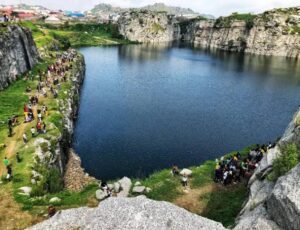
12) See Aso Rock from approved viewpoints
The signature monolith behind the Three Arms Zone is photogenic from various vantage points in town. Note: access to sensitive zones is restricted.
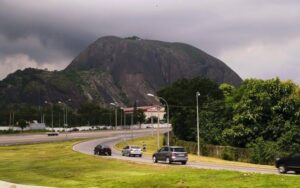
13) Snap Abuja City Gate & monuments
Quick photo stop when arriving/departing—best at sunrise or late afternoon.
14) Explore Wuse Market (open market culture)
The city’s biggest open market. Expect produce, fabrics, phone accessories, crafts—plus bargaining. Go during the day, keep valuables secure.
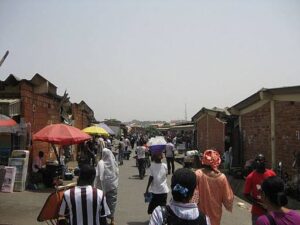
15) Shop + cinema combo at Jabi Lake Mall
Retail therapy with dining and a modern cinema. Mall hours are typically 9am–9pm (Sun 10am–9pm).
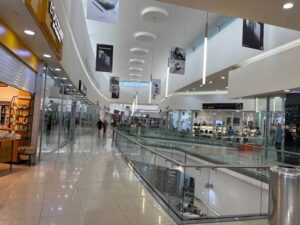
16) Take a Zuma Rock day trip (Madalla, Niger State)
About 35–40 km from central Abuja, the giant monolith rises over the plains and famously appears on Nigeria’s ₦100 note.
Combine it with Gurara Falls if you have time.
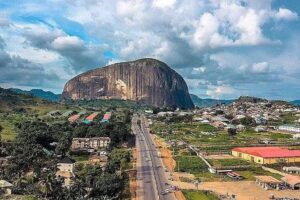
17) Add Gurara Falls (seasonal wow)
Located in Niger State; most impressive in rainy season but still scenic year-round. (Road conditions can vary—ask locally before you go.)
18) Try a bicycle or jog loop at Jabi Lake Park
Cooler mornings or evenings are best. (Hydrate!)
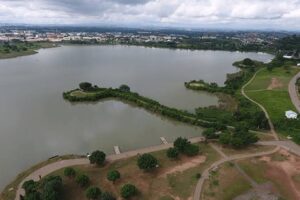
19) Photograph city sunsets
Great vantage points include Jabi Lake shoreline and hilltops near Maitama.
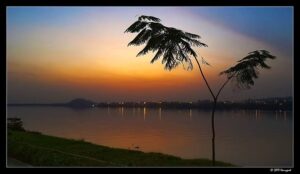
20) Join a guided Abuja city tour
If you’re short on time, curated tours hit the key landmarks, crafts market, and a lakeside stop in one run.
21) Visit Ushafa Pottery Village (Bwari Area Council)
Learn about traditional pottery techniques tied to Abuja’s ceramics heritage (see Ladi Kwali’s legacy).

22) Browse art-friendly cafés
Cafés in Wuse II and Maitama often show local art—pair espresso with browsing.
23) Hunt down “bush bars” for suya
Evenings come alive at informal outdoor spots across the city (think grilled suya and chilled drinks).
24) National events at MKO Abiola National Stadium
From sports tournaments to concerts, the stadium area hosts big gatherings—check listings if you’re in town.

25) Discover Pedam Lake (for seasoned explorers)
A vast, serene lake behind the Presidential Villa area—go with a local guide.
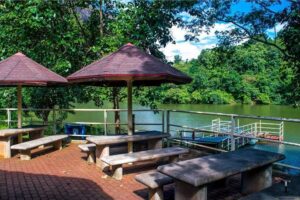
26) Lower Usuma (Usman) Dam outlook
A picturesque reservoir serving the city; access varies—some visits require permission or a guide; check before going.
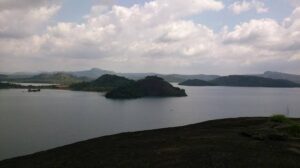
27) Daytime mall hopping: Ceddi Plaza & Silverbird
Classic Abuja shopping-and-movie combo (especially helpful during heat).
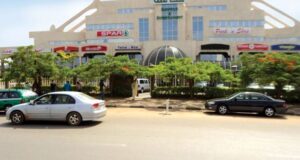
Eat & Drink: Where to Taste Abuja
- Wakkis (Wuse II): Long-time favorite for tandoor grills and hearty meals; open roughly 11am–11pm daily.
- Nkoyo: Loved for Nigerian classics in a stylish setting; good for groups.
- Kapadoccia (The Cave Restaurant): Atmospheric “cave” interior and photo-worthy plating; walk-ins welcome but peak times fill up.
Local must-tries: Suya (spiced grilled meat), jollof rice, pepper soup, grilled fish (catfish), and zobo (hibiscus drink).
Free or Low-Cost Abuja
- Millennium Park (free)
- City Park and Central Park (small activity fees)
- Mpape Crushed Rock (free)
- Jabi Lake Park (free walk)
- Wuse Market (window shopping)
- Arts & Crafts Village (browse before you buy)
Perfect First Visit: 24–48–72 Hour Itineraries
24 Hours (Essentials)
- Morning: Millennium Park → quick photos of Aso Rock vistas.
- Noon: National Mosque & Christian Centre (check worship times).
- Afternoon: Jabi Lake Mall (lunch + Silverbird matinee).
- Evening: Dinner at Wakkis / Nkoyo.
48 Hours (Add Outdoors & Art)
- Day 1 as above.
- Day 2 AM: Mpape Crushed Rock hike (early). PM: Thought Pyramid Art Centre + Arts & Crafts Village. Dinner: Kapadoccia.
72 Hours (Add Day Trip)
- Day 3: Zuma Rock (and, if time and conditions allow, Gurara Falls). Return for a lakeside sunset at Jabi.
Getting Around (Easy Options)
- Ride-hailing: Uber and Bolt operate widely in Abuja—handy from airport to city and between districts.
- Abuja Rail Mass Transit (Light Rail): Relaunched on May 29, 2024, connecting the city center, Idu (national rail), and the international airport; the relaunch initially offered free rides. Check current schedules and fares.
Where to Stay (Neighborhoods)
- Maitama: Embassies, gardens, quiet streets—great for calm stays.
- Wuse II: Lively dining and nightlife, central to many attractions.
- Central Area: Close to landmarks, easy to navigate.
- Jabi: Lakeside vibe, mall, cinema.
Practical Tips (Safety, Etiquette, Money)
- Dress & worship sites: Dress modestly; ask before photos; avoid prayer times at the Mosque.
- Markets: Bargain politely; carry small bills; keep valuables zipped.
- Sun & hydration: Abuja’s sun is intense—hat, SPF, and water are musts.
- Outdoors: At Mpape and lakes, keep a safe distance from ledges and obey notices.
- Permissions: For Lower Usuma Dam, access can vary; some visits require prior permission—check with local operators or the FCT Water Board.
FAQs
1) What’s the absolute must-do for a short trip?
Millennium Park + National Mosque/Christian Centre + Jabi Lake at sunset gives you nature, culture, and a relaxing finish.
2) Is Abuja a good family destination?
Yes—Magicland, National Children’s Park & Zoo, Central Park (mini-golf) and lakeside walks at Jabi are family-friendly picks.
3) Can I get around without a car?
Absolutely. Uber and Bolt cover the city, and the Abuja Rail links the airport with the city.
4) What about souvenirs?
Head to the Arts & Crafts Village for wood carvings, masks, beads, and textiles. Haggle respectfully.
5) Are there real hikes in Abuja?
Yes—Mpape Crushed Rock (scenic cliffs) and hill trails around Usuma Dam (if access is permitted) are popular. Go early and be cautious.
6) Any rainy-season tips?
Roads to day-trip sites (e.g., Gurara Falls) can be muddy; check conditions with a local operator before setting out.
7) Is Jabi Lake Mall worth it?
Yes for convenient shopping, dining, and Silverbird Cinemas if you want a cool, modern break.
Conclusion
Abuja blends calm green spaces, contemporary culture, and day trips that feel a world away—without long drives.
Use this guide to plan the perfect things to do in Abuja, Nigeria itinerary, then explore at your pace.
👉 Like helpful, on-time travel intel?
Subscribe to push notifications to get fresh Abuja tips, updates, and itineraries.
Also read: Top 10 Best Places To Visit In Abuja






